Jun 21, 2018 | Focolare Worldwide
Pope Francis has embarked on an ecumenical pilgrimage which is taking place today at the Ecumenical Centre in Geneva (Switzerland), on the occasion of the 70th anniversary of the foundation of the World Council of Churches (WCC). The theme of the celebration: “Walking, praying and working together”. The WCC is the largest and most inclusive body among the various ecumenical organizations. Founded in Amsterdam, in the Netherlands, in 1948, it currently comprises about 350 churches in 110 countries around the world and represents about 500 million Christians. Based in Geneva, it includes most of the Orthodox churches, numerous historical Protestant churches (Anglican, Baptist, Lutheran, Methodist, the Reformed Church) and several independent churches. The Catholic Church is not a member of WCC, but Catholic theologians work in important commissions as fully fledged members. Among the scheduled appointments include the common prayer and the afternoon meeting in the presence of the Reverend Olav Fykse Tveit and Mr Agnes Abuom, respectively Secretary General and Moderator of WCC. In conclusion there will be a significant greeting to the eight members of North Korea and South Korea.
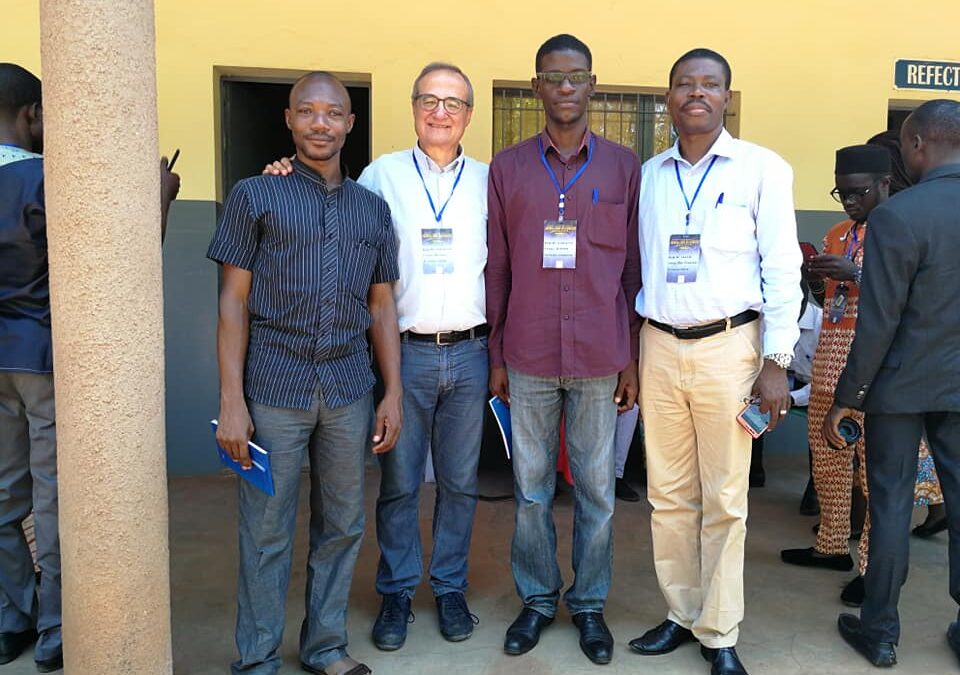
Jun 20, 2018 | Focolare Worldwide
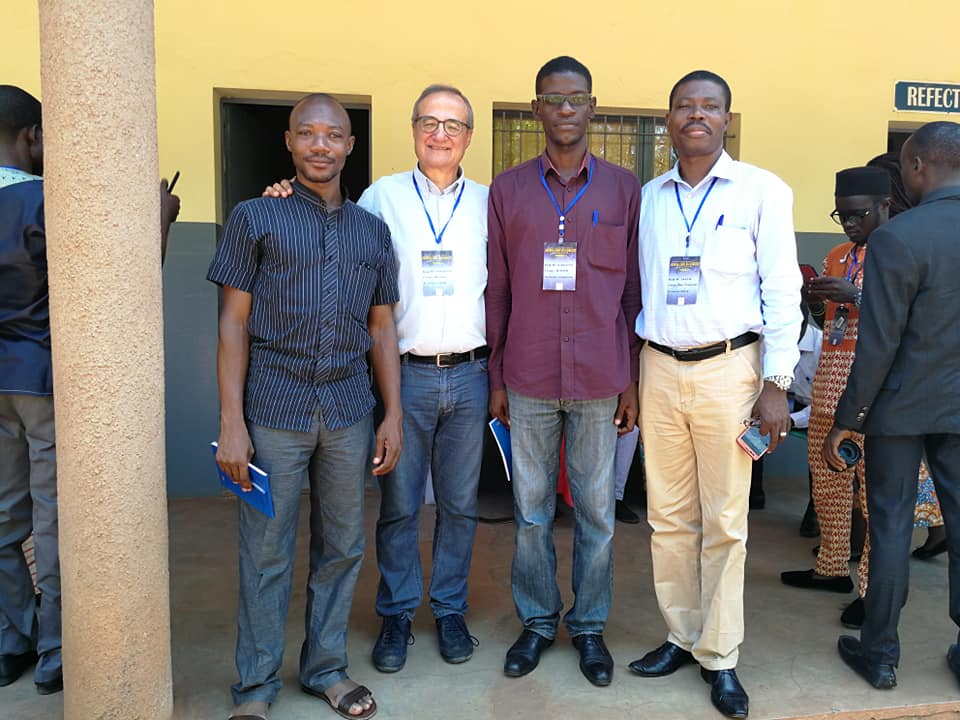 A seminar on the Journalism of Dialogue took place in Bodo-Dioulasso in Burkina Faso from 9 to 13 June. Michele Zanzucchi from Italy, Guy Roland from Benin, Armand Djoualeu from Cameroon plus many Christian and Muslim professionals and students from Niger, Mali, Ivory Coast, Benin and Burkina Faso participated. The aim of the seminar was to equip journalists with the skills of dialogue whereby respect and responsibility is shown towards each person. The seminar opened with a round table on the “journalism of migration” which was attended by representatives from the government and from the Catholic church. One of the proposals emerging from this was the desire to form a regional network of journalists who can correctly form and inform the public about migration, especially migration to Europe.
A seminar on the Journalism of Dialogue took place in Bodo-Dioulasso in Burkina Faso from 9 to 13 June. Michele Zanzucchi from Italy, Guy Roland from Benin, Armand Djoualeu from Cameroon plus many Christian and Muslim professionals and students from Niger, Mali, Ivory Coast, Benin and Burkina Faso participated. The aim of the seminar was to equip journalists with the skills of dialogue whereby respect and responsibility is shown towards each person. The seminar opened with a round table on the “journalism of migration” which was attended by representatives from the government and from the Catholic church. One of the proposals emerging from this was the desire to form a regional network of journalists who can correctly form and inform the public about migration, especially migration to Europe.
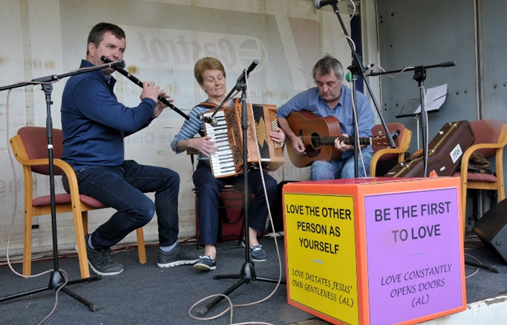
Jun 20, 2018 | Focolare Worldwide
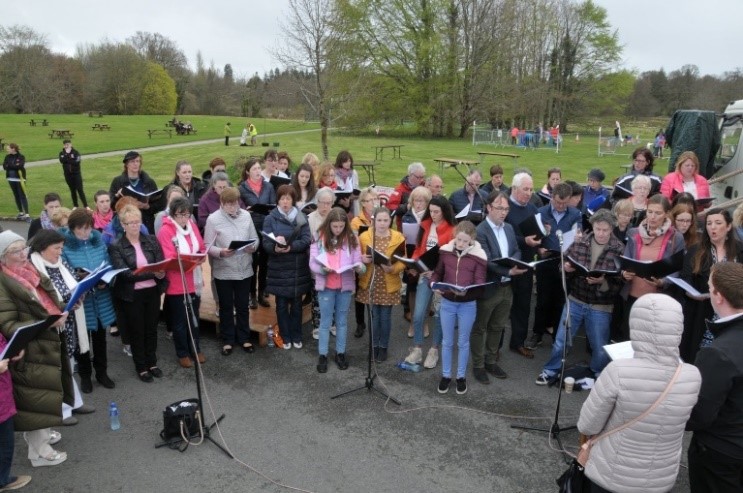 Lough Key Forest Park is close to 2,000 acres of silence, natural paths, majestic cedars and a lake on the south coast oif Lough Key, 25 miles southwest of Sligo Town and 2 miles east of Boyle. This was the setting for a day for families organized by the Diocese of Elphin at the end of April. In collaboration with Bishop Kevin Doran, one of the promoters for the event was the Focolare Movement. “All are invited to an atmosphere full of play, sharing and friendship,” the bishop had said, “including families of other religious denominations, neighbors and friends.” The goal was to prepare for the main event with Pope Francis in the Irish capital, which will bring together families from all over the world at the end of August. The theme will be “The Gospel of the Family: Joy for the World.” Every three years, this international event puts the focus once again on Christian families, as cornerstones of society. Following the opening on August 21, which will be held simultaneously in all the Irish dioceses, there will be an international conference in Dublin for three days (22–24), featuring experts from various parts of the world, experiences, workshops and activities for children and teens. With the Holy Father’s arrival on August 25, there will be an immense festival for families, a chance to hear music and experiences from the continents, as well as, naturally, long-awaited words from the pope. Pope Francis will celebrate a solemn Eucharistic service on the 26th at Phoenix Park in Dublin, which will close the event. “We aren’t many in this part of Ireland,” the Focolare community writes, “but we wanted to respond to the bishop’s invitation.” For a year now, Ireland has been more aware of the complex dynamics in each family, as well its role in society. Together with all the families of the diocese, preparations are underway for collective reflection in the light of the apostolic exhortation Amoris Laetiita. Supported by the entire Focolare community, Evelyn is part of the preparatory committee. “For me this is a great opportunity to build relationships of unity with everyone. Every idea, every contribution, every decision or action to take has been the result of moving forward together with the bishop. There’s been a climate of mutual love created among us all.”
Lough Key Forest Park is close to 2,000 acres of silence, natural paths, majestic cedars and a lake on the south coast oif Lough Key, 25 miles southwest of Sligo Town and 2 miles east of Boyle. This was the setting for a day for families organized by the Diocese of Elphin at the end of April. In collaboration with Bishop Kevin Doran, one of the promoters for the event was the Focolare Movement. “All are invited to an atmosphere full of play, sharing and friendship,” the bishop had said, “including families of other religious denominations, neighbors and friends.” The goal was to prepare for the main event with Pope Francis in the Irish capital, which will bring together families from all over the world at the end of August. The theme will be “The Gospel of the Family: Joy for the World.” Every three years, this international event puts the focus once again on Christian families, as cornerstones of society. Following the opening on August 21, which will be held simultaneously in all the Irish dioceses, there will be an international conference in Dublin for three days (22–24), featuring experts from various parts of the world, experiences, workshops and activities for children and teens. With the Holy Father’s arrival on August 25, there will be an immense festival for families, a chance to hear music and experiences from the continents, as well as, naturally, long-awaited words from the pope. Pope Francis will celebrate a solemn Eucharistic service on the 26th at Phoenix Park in Dublin, which will close the event. “We aren’t many in this part of Ireland,” the Focolare community writes, “but we wanted to respond to the bishop’s invitation.” For a year now, Ireland has been more aware of the complex dynamics in each family, as well its role in society. Together with all the families of the diocese, preparations are underway for collective reflection in the light of the apostolic exhortation Amoris Laetiita. Supported by the entire Focolare community, Evelyn is part of the preparatory committee. “For me this is a great opportunity to build relationships of unity with everyone. Every idea, every contribution, every decision or action to take has been the result of moving forward together with the bishop. There’s been a climate of mutual love created among us all.”  At the entrance to the immense public park, hanging from the tree branches, were the six sides of the Cube of Love, which included words from Amoris Laetitia and Chiara Lubich on the family. Moving in the wind, the cube greeted the public upon arrival. The same cube was rolled on stage at the beginning of the day, so that everyone could tune in to the message, “Be the first to love.” The day was a festive sequence of music and workshops on caring for the environment, family games, entertainment, face painting, dance and helping the needy. There was a particularly intense moment of prayer together, led by the Anglican and Catholic bishops. They later cut a cake together, which not by chance was cube shaped. The moment was captured permanently by the local paper, the Roscommon Herald, and other websites and newsletters. At the end of the day one of the participants, Andrew, sang a song he had written about the three words that Pope Francis had suggested for family life: “Please”, “Thanks” and “Sorry.” “As I was circulating among the people,” said Áine from the Focolare, “I thought of the words from ‘The great attraction of modern times,’ a meditation written by Chiara Lubich. I felt they described that moment, in the midst of a crowd made up of people from faraway villages and countries – not just Catholics, but other religious denominations. “Some were from even further away, like those who had just arrived as refugees and asylum seekers, mostly Muslims from Africa and the Middle East. They were surprised to find such a focus on the family in Ireland as well.”
At the entrance to the immense public park, hanging from the tree branches, were the six sides of the Cube of Love, which included words from Amoris Laetitia and Chiara Lubich on the family. Moving in the wind, the cube greeted the public upon arrival. The same cube was rolled on stage at the beginning of the day, so that everyone could tune in to the message, “Be the first to love.” The day was a festive sequence of music and workshops on caring for the environment, family games, entertainment, face painting, dance and helping the needy. There was a particularly intense moment of prayer together, led by the Anglican and Catholic bishops. They later cut a cake together, which not by chance was cube shaped. The moment was captured permanently by the local paper, the Roscommon Herald, and other websites and newsletters. At the end of the day one of the participants, Andrew, sang a song he had written about the three words that Pope Francis had suggested for family life: “Please”, “Thanks” and “Sorry.” “As I was circulating among the people,” said Áine from the Focolare, “I thought of the words from ‘The great attraction of modern times,’ a meditation written by Chiara Lubich. I felt they described that moment, in the midst of a crowd made up of people from faraway villages and countries – not just Catholics, but other religious denominations. “Some were from even further away, like those who had just arrived as refugees and asylum seekers, mostly Muslims from Africa and the Middle East. They were surprised to find such a focus on the family in Ireland as well.”
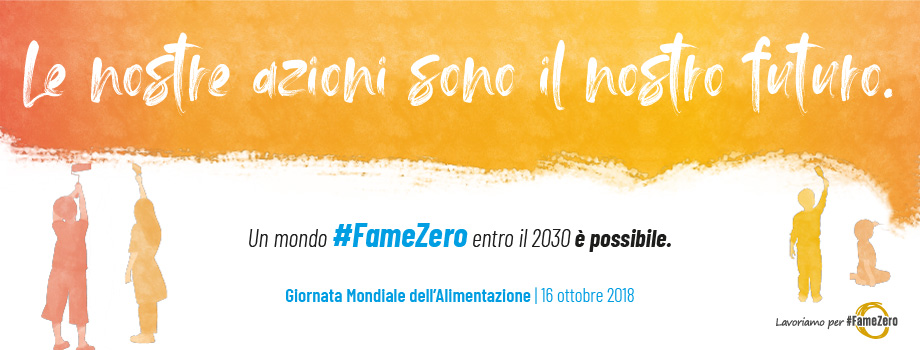
Jun 19, 2018 | Non categorizzato
 The adolescents and youths can become the first generation to succeed in uprooting hunger in the world. This is stated in the 17 Sustainable Development Goals (SDG), approved on 25 September 2015 by the 193 Member States of the UN, with the commitment to achieve them in 15 years (2015-2030). The second objective, “Zero Hunger,” is the core of this programme. To be able to reach it, the UN’s Food and Agriculture Organisation (FAO) places its bet on the new generations. The boys and girls of the Focolare Movement have decided to make this the key theme of their annual training congress, from 20 to 24 June. While 630 girls will meet at the International Mariapolis Centre in Castel Gandolfo, 250 boys will hold their meetings in the international town of Loppiano (Florence). The participants shall come from various countries of Europe and South America. In Loppiano, the 250 boys will deepen the “Zero Hunger” theme and try to see how to actualise it in daily life, rediscovering values like courage, forgiveness, service, endeavour, spirituality, responsibility, loyalty, and acknowledgment of the capacities of others. The girls instead shall live a special day on 22 June, when they will visit the international headquarters of the FAO in the centre of Rome, to participate in the discussion on the “Zero Hunger” goal. At the end of the session, they will receive the “Zero Hunger Citizens” passport. Replay the streaming on 22 June 2018, at 11 am (Rome). Lorenzo Russo
The adolescents and youths can become the first generation to succeed in uprooting hunger in the world. This is stated in the 17 Sustainable Development Goals (SDG), approved on 25 September 2015 by the 193 Member States of the UN, with the commitment to achieve them in 15 years (2015-2030). The second objective, “Zero Hunger,” is the core of this programme. To be able to reach it, the UN’s Food and Agriculture Organisation (FAO) places its bet on the new generations. The boys and girls of the Focolare Movement have decided to make this the key theme of their annual training congress, from 20 to 24 June. While 630 girls will meet at the International Mariapolis Centre in Castel Gandolfo, 250 boys will hold their meetings in the international town of Loppiano (Florence). The participants shall come from various countries of Europe and South America. In Loppiano, the 250 boys will deepen the “Zero Hunger” theme and try to see how to actualise it in daily life, rediscovering values like courage, forgiveness, service, endeavour, spirituality, responsibility, loyalty, and acknowledgment of the capacities of others. The girls instead shall live a special day on 22 June, when they will visit the international headquarters of the FAO in the centre of Rome, to participate in the discussion on the “Zero Hunger” goal. At the end of the session, they will receive the “Zero Hunger Citizens” passport. Replay the streaming on 22 June 2018, at 11 am (Rome). Lorenzo Russo
Jun 19, 2018 | Non categorizzato
World Refugee Day will be celebrated on June 20th at the behest of the UN General Assembly to highten awareness of the conditions of millions of refugees seeking asylum, as they flee war and violence in their own countries. The UN Agency for Refugees has launched the “#With Refugees” campaign, to give visibility to the gestures of solidarity towards refugees, giving voice to those who welcome and strengthen the encounter between local communitites and asylum seekers. But “#With Refugees” is also an appeal, by the UN’s High Commissioner for Refugees (UNHCR) that calls upon governments to ensure that every refugee child receives an education, that every refugee family has a safe place to live, and that every refugee can have access to a job or acquire new skills that will allow them to contribute to the community. The petition will be presented to the UN Assembly in 2018 at the adoption of the Global Compact for refugees. “Today,” says Carlotta Sami, spokesperson for the UNHCR for South Europe, “being on the side of the refugees is not only a humanitarian act; unfortunately, it is an act of bravery. It has become uncomfortable to be on the side of those who have chosen to leave their own countries and face a very heavy challenge – tha of starting again from zero in a new environment, often indifferent and, in the worst cases, hostile.” There have been numerous events at the end of this month. See: www.unhcr.org/withrefugees
Jun 18, 2018 | Non categorizzato
The first eruptions of the Fuego Volcano on 3rd June were so violent that many inhabitants of the villages along its slopes did not have time to escape. The eruptions continued for days after, causing fast moving currents of mud, rubble and burning embers called “Lahar”, which descended from the volcano, covering and destroying all that lay in its path. It also provoked earth disturbances that felt like earthquakes. The National Coordination for Disaster Reduction, CONRED, confirmed a state of alert in three districts, providing updates on the numbers of displaced people and coordinating the generous offers of emergency accommodation by hostels and hotels in the vicinity. Lourdes Barrientos is part of the CONRED team. She explained, «One of my responsibilities is to train and organize communities to respond to emergencies and natural disasters. Here we are in an emergency with so much suffering, loss of life and property in many families living near the volcano, especially in the communities of Chimaltenango, Escuintila e Sacatepéquez». These districts remain on red alert. As the number of people known to have died increases inexorably, the support response is coordinated from the CONRED headquarters in Guatemala City. «I have to go beyond my exhaustion to complete all the different tasks assigned to me. At first I did not find it straight forward, because it felt like I was wasting time staying in the headquarters instead of helping the victims, my people, directly. My job, in fact, was to collect and collate as much information as possible from the stricken communities, to facilitate the response of the institutions who had to face all these huge problems. It really got me down. My companions were active in the front line in places hit by the 3rd June eruptions, searching for bodies and helping the survivors. I knew how exhausted they were getting. I knew they were busy organizing emergency accommodation in the locality, while I was sitting in an office. At the same time, I was receiving endless messages from friends and well-wishers, from my family and Focolare friends, all asking if I was OK and if I was in the volcano zone. Suddenly I understood that wherever I was working, the important thing was to give all of myself, trying never to lose patience despite the nervous and physical exhaustion we were all experiencing. We are all in the front line. I can offer all I’m doing for my companions who are out there, in particular for one who died during the rescue operation. Requests for information about the victims keep pouring in. There’s so much suffering and such great need. Many people are offering help, many hotels have opened their doors. The love of many people is arriving in practical ways. This is what gives us the strength to carry on».
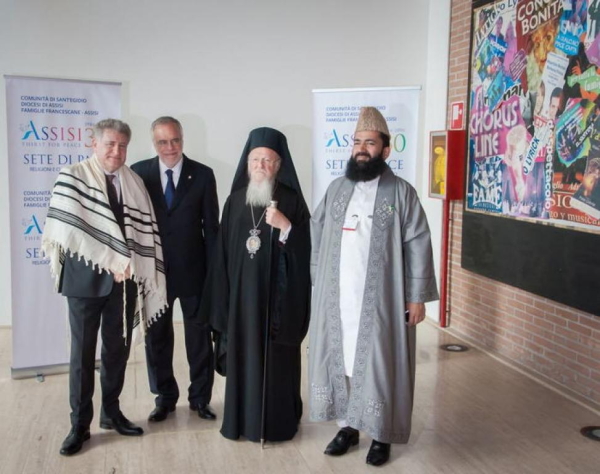
Jun 18, 2018 | Non categorizzato

Foto: www.santegidio.org
![The same longing for happiness]()
Jun 18, 2018 | Non categorizzato
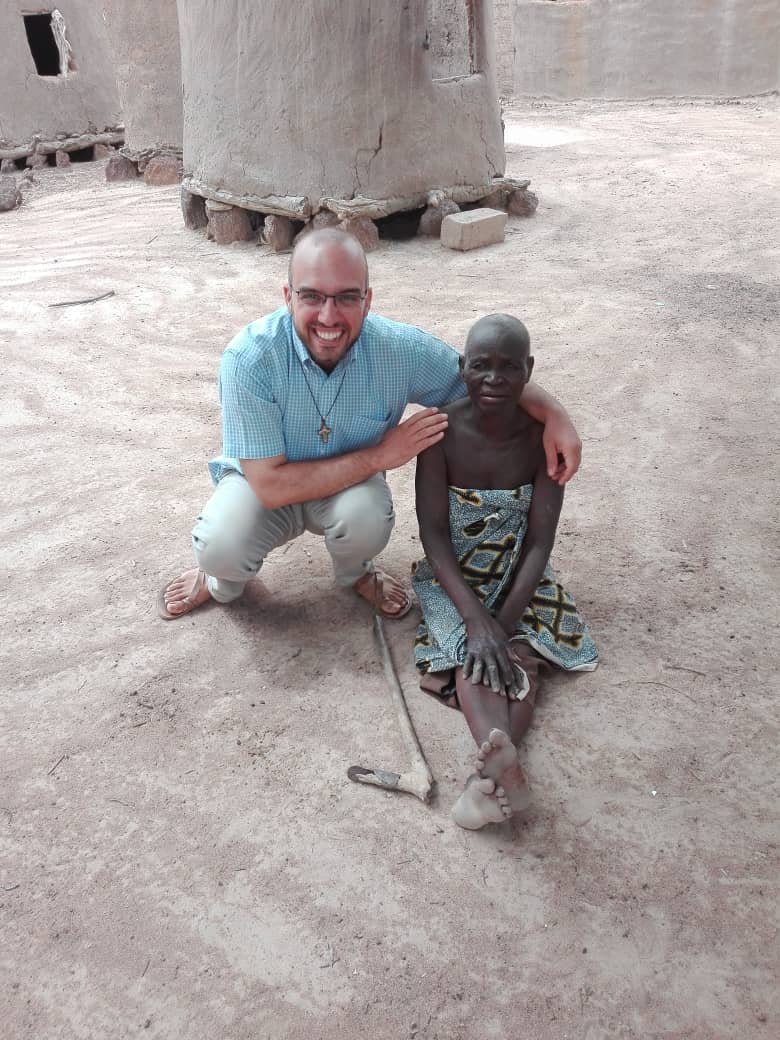 As he often does, a few days ago Fr. Domenico took advantage of a few spare moments and wrote, “I don’t feel I left on my own behalf or even for the Missionary Community of Villaregia to which I belong. I feel I am here on behalf of the whole Church – on behalf of people who are not able to leave their own country for a long period of time. That is why I am writing to you so that we can be ‘missionaries together.’” He wrote a long letter that was full of detail. He said that he was fascinated by a place that was “different from what we know but where men and women have the same desires, fears, worries and hopes as everyone else.” He continued by saying, “If you change the context, you change the problems and the impact they have on life. However, every human being, irrespective of whether they live in Europe or in Africa, longs for the same thing: they want to find themselves and be happy.” He explained what had happened the previous week. At 7 am two girls had knocked on the door. One was eighteen and the other twenty years of age and they both looked really sad. They had become friends a year ago when they were receiving instruction before baptism. The older girl was three months pregnant. The father of the child had disappeared as soon as he had heard the girl was expecting a baby. In that part of the world, to be pregnant without the recognition and support of the father is seen as a serious situation. The woman is labelled as being “no good”, she brings shame to her town, she will lose her job and be rejected by everyone, even her family. In fact, the friend’s sister with whom the pregnant girl had stayed, had said, “Now either you convert to our religion (a widespread sect) or you have to leave.” The two girls had run away together, desperately looking for somewhere to stay. Crying, the pregnant girl said, “I’ve been baptised – I know Jesus. I don’t want to betray him now. What am I going to do?” She didn’t even consider the possibility of abortion or of converting to another faith just to return to her life as it had been before. At just twenty years of age, true to herself as a woman and mother, she is capable of taking responsibility for her actions even though she has no money, home, family or good reputation. Fr. Domenico said that this made him think about his own faithfulness. He said, “Obviously, with the support of the other missionary priests, I tried to help her. At the moment, she is staying with a family from the parish who have given her a room in their poor home. Other people are in contact with her own family and are trying to persuade them to welcome her back. We are covering the costs of all medical checks which must be paid by the individual. Expenses are high for someone who has nothing.”
As he often does, a few days ago Fr. Domenico took advantage of a few spare moments and wrote, “I don’t feel I left on my own behalf or even for the Missionary Community of Villaregia to which I belong. I feel I am here on behalf of the whole Church – on behalf of people who are not able to leave their own country for a long period of time. That is why I am writing to you so that we can be ‘missionaries together.’” He wrote a long letter that was full of detail. He said that he was fascinated by a place that was “different from what we know but where men and women have the same desires, fears, worries and hopes as everyone else.” He continued by saying, “If you change the context, you change the problems and the impact they have on life. However, every human being, irrespective of whether they live in Europe or in Africa, longs for the same thing: they want to find themselves and be happy.” He explained what had happened the previous week. At 7 am two girls had knocked on the door. One was eighteen and the other twenty years of age and they both looked really sad. They had become friends a year ago when they were receiving instruction before baptism. The older girl was three months pregnant. The father of the child had disappeared as soon as he had heard the girl was expecting a baby. In that part of the world, to be pregnant without the recognition and support of the father is seen as a serious situation. The woman is labelled as being “no good”, she brings shame to her town, she will lose her job and be rejected by everyone, even her family. In fact, the friend’s sister with whom the pregnant girl had stayed, had said, “Now either you convert to our religion (a widespread sect) or you have to leave.” The two girls had run away together, desperately looking for somewhere to stay. Crying, the pregnant girl said, “I’ve been baptised – I know Jesus. I don’t want to betray him now. What am I going to do?” She didn’t even consider the possibility of abortion or of converting to another faith just to return to her life as it had been before. At just twenty years of age, true to herself as a woman and mother, she is capable of taking responsibility for her actions even though she has no money, home, family or good reputation. Fr. Domenico said that this made him think about his own faithfulness. He said, “Obviously, with the support of the other missionary priests, I tried to help her. At the moment, she is staying with a family from the parish who have given her a room in their poor home. Other people are in contact with her own family and are trying to persuade them to welcome her back. We are covering the costs of all medical checks which must be paid by the individual. Expenses are high for someone who has nothing.” 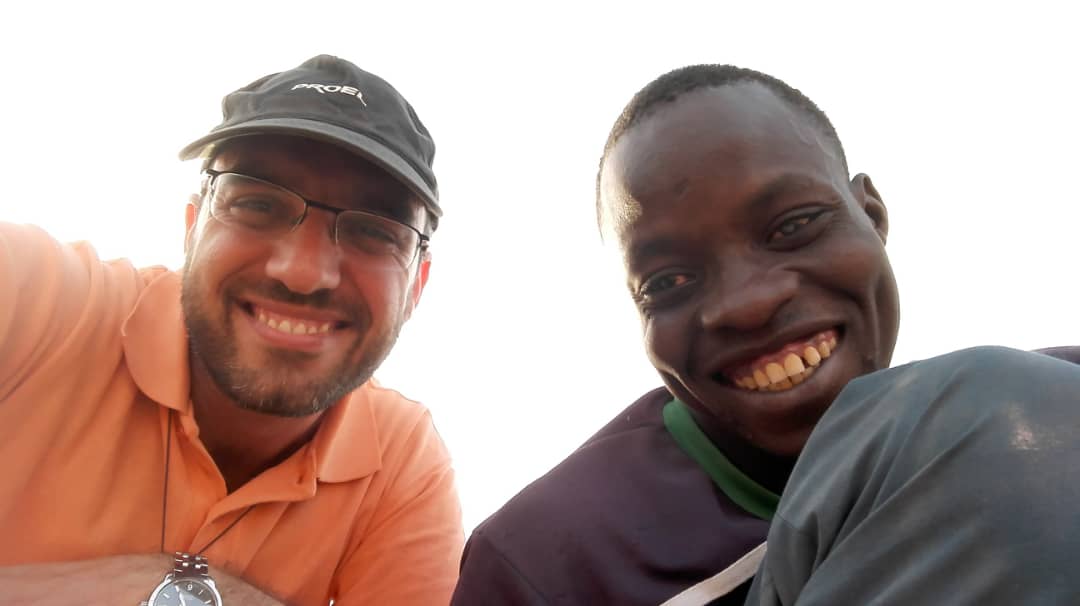 Domenico continues “I have begun to be good friends with Adam too. He is 23 years old. He had lost both his parents by the time he was 7 and he was brought up by a paternal uncle. He managed to continues with his studies as far as high school thanks to funding from a French NGO that operated an ‘adoption at a distance’ scheme. However, at a certain point, he had to stop because the money he had received was stolen. Thus, his hopes of studying ended. Now he lives on his own in a little house made of mud and he often doesn’t have enough to eat. His dream is to open a little office with a computer and sell stationery. He is always happy and never neglects his commitments in the parish. One Sunday afternoon, he was in the house with some other young people. When there was a pause in the conversation, he turned to me and said, ‘Why are you here? What makes a European missionary with lots of things to do in the parish – who knows people who have money, cars and beautiful homes – stay here with us? The only thing we have to offer you is a plate of corn and beans. What’s more, it is Sunday……’ Everyone was waiting for the answer. ‘You are important to God and important to me: that’s why I am here.’ One of them said, ‘OK then. If we are important, then we must celebrate,’ and he went to buy some beer.”
Domenico continues “I have begun to be good friends with Adam too. He is 23 years old. He had lost both his parents by the time he was 7 and he was brought up by a paternal uncle. He managed to continues with his studies as far as high school thanks to funding from a French NGO that operated an ‘adoption at a distance’ scheme. However, at a certain point, he had to stop because the money he had received was stolen. Thus, his hopes of studying ended. Now he lives on his own in a little house made of mud and he often doesn’t have enough to eat. His dream is to open a little office with a computer and sell stationery. He is always happy and never neglects his commitments in the parish. One Sunday afternoon, he was in the house with some other young people. When there was a pause in the conversation, he turned to me and said, ‘Why are you here? What makes a European missionary with lots of things to do in the parish – who knows people who have money, cars and beautiful homes – stay here with us? The only thing we have to offer you is a plate of corn and beans. What’s more, it is Sunday……’ Everyone was waiting for the answer. ‘You are important to God and important to me: that’s why I am here.’ One of them said, ‘OK then. If we are important, then we must celebrate,’ and he went to buy some beer.”  “The really hot season is over now. Our house was like an oven. The sheets were roasting, the water in the taps was 50 degrees centigrade. Now we are preparing for the rainy season. One young man told me that last year the rain was so heavy that his mud hut was nearly washed away. His wife had their third child a few weeks ago. He doesn’t earn very much, he has three children and a house that is half ruined. There was nothing very positive about his situation. However, when he saw me, he shouted out, ‘You have come to see us – it’s a sign that God is with us!’ That is the beauty of the people in Burkina Faso. It’s not by chance that the name of their country means ’the land of upright people.’” http://www.cmv.it/it
“The really hot season is over now. Our house was like an oven. The sheets were roasting, the water in the taps was 50 degrees centigrade. Now we are preparing for the rainy season. One young man told me that last year the rain was so heavy that his mud hut was nearly washed away. His wife had their third child a few weeks ago. He doesn’t earn very much, he has three children and a house that is half ruined. There was nothing very positive about his situation. However, when he saw me, he shouted out, ‘You have come to see us – it’s a sign that God is with us!’ That is the beauty of the people in Burkina Faso. It’s not by chance that the name of their country means ’the land of upright people.’” http://www.cmv.it/it
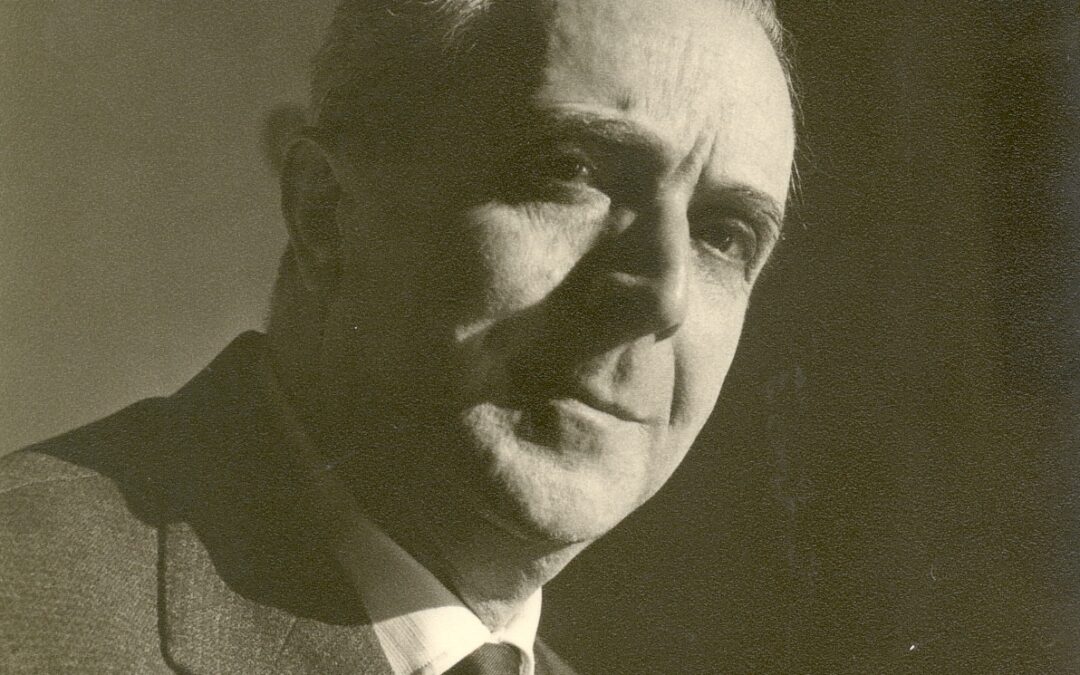
Jun 15, 2018 | Non categorizzato
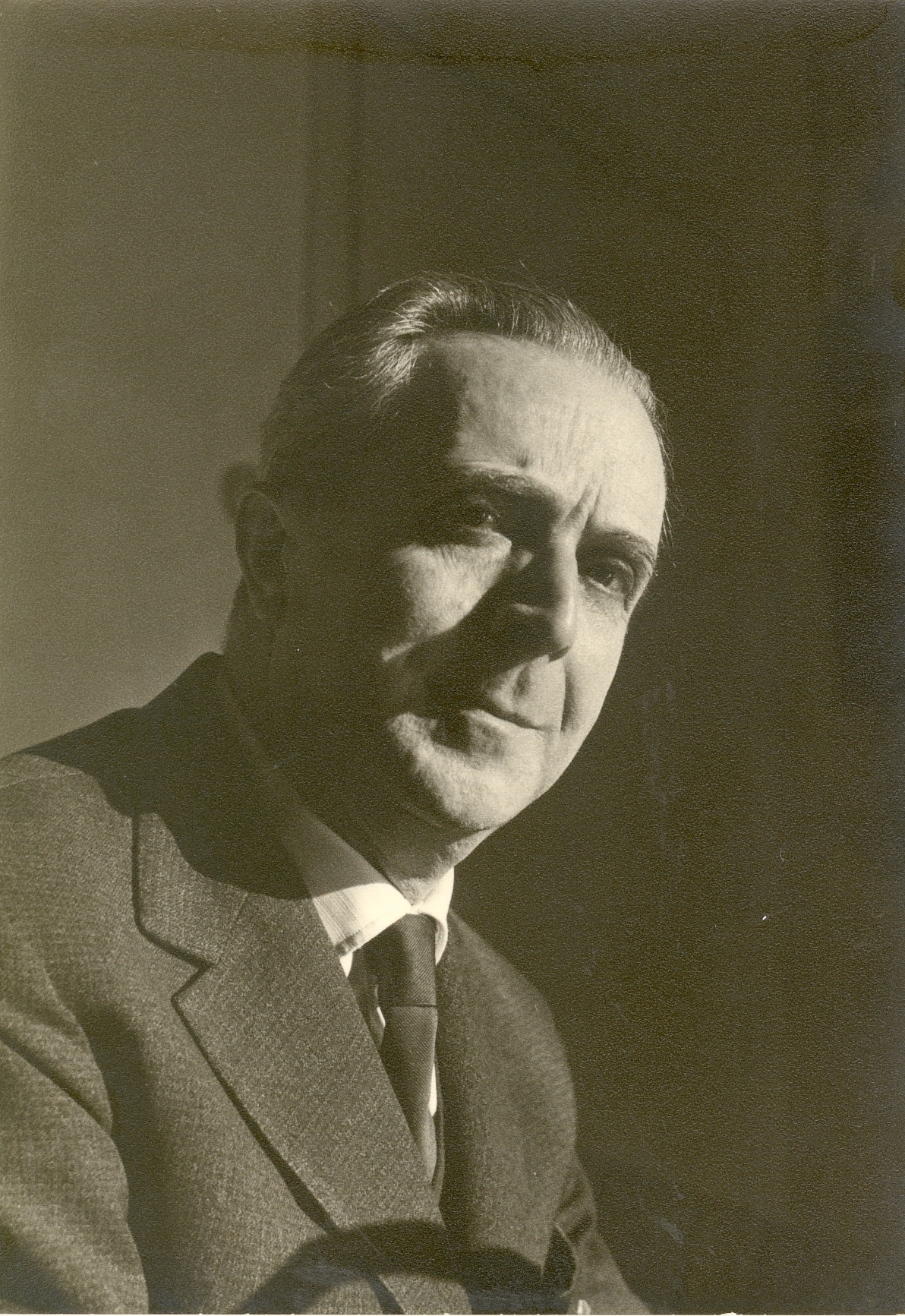 We won’t collect any laurels for what we are doing but we will have a clear conscience. I can’t understand why entering into politics and working in the realms of public life means that a person automatically stops being a Christian. When someone is part of that world, they separate faith from what they do: they reduce doing apostolic works to a denial or rejection of something: today it is anti-communism, in the past it was anti-liberalism or a rejection of Luther…….Denial is valid but once stated, you must take action. Affirmation is even more important. The most essential affirmation is this: whenever I meet another person, whether it be in church, along the road or in parliament, I am meeting a brother or sister, a child of God, redeemed by his precious blood. I must love that person irrespective of class, how they are dressed or what attitude they have. I think that reducing things to denial or rejection is settling upon the absurd idea that there is a right to hate, to avoid positive social action and to impoverish the gospel. Believing that Christianity can be dressed up in such a deformed way, making hatred lawful, is the same as believing that Christianity is a lubricant for human passions of greed and murder. (Igino Giordani. From a letter to Fr. Primo Mazzolari, 2 February 1951.) Serving people is serving God. To serve any citizen – worker, house wife, student or nation – is working for Christ. He told us, “Whatever you do to the least of these my brothers, you do to me.” (Mt. 25:40) If you look at politics in this way, it loses all sense of hostility, hatred and exclusivism. Amidst the variety of opinions that express a richness of ideas, a Christian sees a brother or sister to love even if they belong to a different political party. Even if they reject the opinions, the Christian does not reject the other soul, born of the same Heavenly Father and true heir of his love. (Igino Giordani, The Difficulty of a Christian Today, Citta Nuova, Rome, 1976, p. 129) Catholics in politics should be advocates of the creation of a society inspired by the gospel. This demands an interior poverty, a disregard for wealth and self-importance and a morality that in politics is like oxygen to the lungs. It needs a commitment to power as service, the breaking up of privilege and social classes and to revolution … (Igino Giordani, “The Way” June 1950, p.1) By the Igino Giordani Centre
We won’t collect any laurels for what we are doing but we will have a clear conscience. I can’t understand why entering into politics and working in the realms of public life means that a person automatically stops being a Christian. When someone is part of that world, they separate faith from what they do: they reduce doing apostolic works to a denial or rejection of something: today it is anti-communism, in the past it was anti-liberalism or a rejection of Luther…….Denial is valid but once stated, you must take action. Affirmation is even more important. The most essential affirmation is this: whenever I meet another person, whether it be in church, along the road or in parliament, I am meeting a brother or sister, a child of God, redeemed by his precious blood. I must love that person irrespective of class, how they are dressed or what attitude they have. I think that reducing things to denial or rejection is settling upon the absurd idea that there is a right to hate, to avoid positive social action and to impoverish the gospel. Believing that Christianity can be dressed up in such a deformed way, making hatred lawful, is the same as believing that Christianity is a lubricant for human passions of greed and murder. (Igino Giordani. From a letter to Fr. Primo Mazzolari, 2 February 1951.) Serving people is serving God. To serve any citizen – worker, house wife, student or nation – is working for Christ. He told us, “Whatever you do to the least of these my brothers, you do to me.” (Mt. 25:40) If you look at politics in this way, it loses all sense of hostility, hatred and exclusivism. Amidst the variety of opinions that express a richness of ideas, a Christian sees a brother or sister to love even if they belong to a different political party. Even if they reject the opinions, the Christian does not reject the other soul, born of the same Heavenly Father and true heir of his love. (Igino Giordani, The Difficulty of a Christian Today, Citta Nuova, Rome, 1976, p. 129) Catholics in politics should be advocates of the creation of a society inspired by the gospel. This demands an interior poverty, a disregard for wealth and self-importance and a morality that in politics is like oxygen to the lungs. It needs a commitment to power as service, the breaking up of privilege and social classes and to revolution … (Igino Giordani, “The Way” June 1950, p.1) By the Igino Giordani Centre
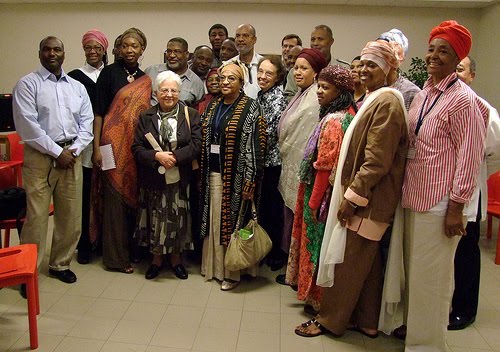
Jun 14, 2018 | Focolare Worldwide
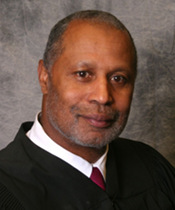 He has been a civil court judge of the Marion Court in Indianapolis since 1999, and in 2007 he was declared Judge of the Year because of his work among prisoners and drug defendants. David Shaheed is African-American and Muslim. He he shares his passion for law and interreligious dialogue. Since 2019 he has presided over the Interfaith Alliance of Indianapolis. His resume can leave us awestruck, but Dr Shaheed immediately puts us at ease with his simplicity and freedom as he talks about his faith and of the relationship that linked him and continues to link him to Chiara Lubich. She gave me the courage to step beyond our faiths, to help the other and to understand them. But this didn’t remain an abstract concept, because Chiara gave me the means by which to live and show it.” The judge drew inspiration from the experience of destruction of the Second World War that Chiara Lubich went through, to come up with a reform of his court. “The world was under the pressure of this enormous war. And yet this young woman from Trent overcame her personal fears in order to seek out the sufferings of others: Her witness gave me the courage to establish in my workplace on the bench a special tribunal for people with psychological or drug addiction problems.” Breaking a judicial tradition that entrusted the ordinary tribunals with the treatment of defendants with psychic or alcohol and drug dependence, with consequent convictions that do not provide for the rehabilitation of the person, Dr Shaheed asked his colleagues to take note of the impact the prison or probation had on the life of the condemned. In fact many of these returned to court or prison for new crimes without receiving adequate treatment for themselves or for their handicaps. After an initial scepticism and embarrassment, the challenge of “serving the least” has become the common goal of the other judges of the local court which, overcoming the tradition of Common Law that assigns to the courts of appeal expertise on the matter, last year launched a special section for “special” people. In this way the defendants are assisted in accessing cures and specialized advice both in prison and in court, so that the entire judicial system are oriented to the needs of the person and not to conviction and punishment for petty crimes.
He has been a civil court judge of the Marion Court in Indianapolis since 1999, and in 2007 he was declared Judge of the Year because of his work among prisoners and drug defendants. David Shaheed is African-American and Muslim. He he shares his passion for law and interreligious dialogue. Since 2019 he has presided over the Interfaith Alliance of Indianapolis. His resume can leave us awestruck, but Dr Shaheed immediately puts us at ease with his simplicity and freedom as he talks about his faith and of the relationship that linked him and continues to link him to Chiara Lubich. She gave me the courage to step beyond our faiths, to help the other and to understand them. But this didn’t remain an abstract concept, because Chiara gave me the means by which to live and show it.” The judge drew inspiration from the experience of destruction of the Second World War that Chiara Lubich went through, to come up with a reform of his court. “The world was under the pressure of this enormous war. And yet this young woman from Trent overcame her personal fears in order to seek out the sufferings of others: Her witness gave me the courage to establish in my workplace on the bench a special tribunal for people with psychological or drug addiction problems.” Breaking a judicial tradition that entrusted the ordinary tribunals with the treatment of defendants with psychic or alcohol and drug dependence, with consequent convictions that do not provide for the rehabilitation of the person, Dr Shaheed asked his colleagues to take note of the impact the prison or probation had on the life of the condemned. In fact many of these returned to court or prison for new crimes without receiving adequate treatment for themselves or for their handicaps. After an initial scepticism and embarrassment, the challenge of “serving the least” has become the common goal of the other judges of the local court which, overcoming the tradition of Common Law that assigns to the courts of appeal expertise on the matter, last year launched a special section for “special” people. In this way the defendants are assisted in accessing cures and specialized advice both in prison and in court, so that the entire judicial system are oriented to the needs of the person and not to conviction and punishment for petty crimes.  “I grew up in America where there has been a strong history of racism until now, but meeting the Focolare has helped me to realize that not all the whites and their European ancestors held the same hostility toward Afro-Americans. So it was a liberating experience for me, because I was living under the influence of this mentality and for the first time I had brothers of European descent. I learned from the Focolare that Jesus’s life consisted in showing mercy and compassion to others. I learned to live that way as a judge and to experience compassion. For me, being part of the Focolare community means giving the best proof of how to live the attributes of God as written in the Koran; that is, love, mercy and compassion.” Looking at the Movement’s mission ten years on from the death of Chiara Lubich, the judge from Indiana wishes that “the dialogue goes forward, because the Focolare’s model is one of the best models for encounter among people of different religions, ethnic groups or nationalities. In an atmosphere of strong nationalism such as we are living, where one’s own interests take priority over everything else, our experience is a counter-narrative because it shows that the word of God leads people to encounter one another and not to isolate themselves from each another – and this is an example not only for the faith and the religion: but it is an example of life that can serve our country.” Source: Città Nuova no.6., June 6, 2018
“I grew up in America where there has been a strong history of racism until now, but meeting the Focolare has helped me to realize that not all the whites and their European ancestors held the same hostility toward Afro-Americans. So it was a liberating experience for me, because I was living under the influence of this mentality and for the first time I had brothers of European descent. I learned from the Focolare that Jesus’s life consisted in showing mercy and compassion to others. I learned to live that way as a judge and to experience compassion. For me, being part of the Focolare community means giving the best proof of how to live the attributes of God as written in the Koran; that is, love, mercy and compassion.” Looking at the Movement’s mission ten years on from the death of Chiara Lubich, the judge from Indiana wishes that “the dialogue goes forward, because the Focolare’s model is one of the best models for encounter among people of different religions, ethnic groups or nationalities. In an atmosphere of strong nationalism such as we are living, where one’s own interests take priority over everything else, our experience is a counter-narrative because it shows that the word of God leads people to encounter one another and not to isolate themselves from each another – and this is an example not only for the faith and the religion: but it is an example of life that can serve our country.” Source: Città Nuova no.6., June 6, 2018


 A seminar on the Journalism of Dialogue took place in Bodo-Dioulasso in
A seminar on the Journalism of Dialogue took place in Bodo-Dioulasso in 
 Lough Key Forest Park is close to 2,000 acres of silence, natural paths, majestic cedars and a lake on the south coast oif Lough Key, 25 miles southwest of Sligo Town and 2 miles east of Boyle. This was the setting for a day for families organized by the Diocese of Elphin at the end of April. In collaboration with Bishop Kevin Doran, one of the promoters for the event was the Focolare Movement. “All are invited to an atmosphere full of play, sharing and friendship,” the bishop had said, “including families of other religious denominations, neighbors and friends.” The goal was to prepare for the main event with Pope Francis in the Irish capital, which will bring together families from all over the world at the end of August. The theme will be “The Gospel of the Family: Joy for the World.” Every three years, this international event puts the focus once again on Christian families, as cornerstones of society. Following the opening on August 21, which will be held simultaneously in all the Irish dioceses, there will be an international conference in Dublin for three days (22–24), featuring experts from various parts of the world, experiences, workshops and activities for children and teens. With the Holy Father’s arrival on August 25, there will be an immense
Lough Key Forest Park is close to 2,000 acres of silence, natural paths, majestic cedars and a lake on the south coast oif Lough Key, 25 miles southwest of Sligo Town and 2 miles east of Boyle. This was the setting for a day for families organized by the Diocese of Elphin at the end of April. In collaboration with Bishop Kevin Doran, one of the promoters for the event was the Focolare Movement. “All are invited to an atmosphere full of play, sharing and friendship,” the bishop had said, “including families of other religious denominations, neighbors and friends.” The goal was to prepare for the main event with Pope Francis in the Irish capital, which will bring together families from all over the world at the end of August. The theme will be “The Gospel of the Family: Joy for the World.” Every three years, this international event puts the focus once again on Christian families, as cornerstones of society. Following the opening on August 21, which will be held simultaneously in all the Irish dioceses, there will be an international conference in Dublin for three days (22–24), featuring experts from various parts of the world, experiences, workshops and activities for children and teens. With the Holy Father’s arrival on August 25, there will be an immense 

 As he often does, a few days ago Fr. Domenico took advantage of a few spare moments and wrote, “I don’t feel I left on my own behalf or even for the Missionary Community of Villaregia to which I belong. I feel I am here on behalf of the whole Church – on behalf of people who are not able to leave their own country for a long period of time. That is why I am writing to you so that we can be ‘missionaries together.’” He wrote a long letter that was full of detail. He said that he was fascinated by a place that was “different from what we know but where men and women have the same desires, fears, worries and hopes as everyone else.” He continued by saying, “If you change the context, you change the problems and the impact they have on life. However, every human being, irrespective of whether they live in Europe or in Africa, longs for the same thing: they want to find themselves and be happy.” He explained what had happened the previous week. At 7 am two girls had knocked on the door. One was eighteen and the other twenty years of age and they both looked really sad. They had become friends a year ago when they were receiving instruction before baptism. The older girl was three months pregnant. The father of the child had disappeared as soon as he had heard the girl was expecting a baby. In that part of the world, to be pregnant without the recognition and support of the father is seen as a serious situation. The woman is labelled as being “no good”, she brings shame to her town, she will lose her job and be rejected by everyone, even her family. In fact, the friend’s sister with whom the pregnant girl had stayed, had said, “Now either you convert to our religion (a widespread sect) or you have to leave.” The two girls had run away together, desperately looking for somewhere to stay. Crying, the pregnant girl said, “I’ve been baptised – I know Jesus. I don’t want to betray him now. What am I going to do?” She didn’t even consider the possibility of abortion or of converting to another faith just to return to her life as it had been before. At just twenty years of age, true to herself as a woman and mother, she is capable of taking responsibility for her actions even though she has no money, home, family or good reputation. Fr. Domenico said that this made him think about his own faithfulness. He said, “Obviously, with the support of the other missionary priests, I tried to help her. At the moment, she is staying with a family from the parish who have given her a room in their poor home. Other people are in contact with her own family and are trying to persuade them to welcome her back. We are covering the costs of all medical checks which must be paid by the individual. Expenses are high for someone who has nothing.”
As he often does, a few days ago Fr. Domenico took advantage of a few spare moments and wrote, “I don’t feel I left on my own behalf or even for the Missionary Community of Villaregia to which I belong. I feel I am here on behalf of the whole Church – on behalf of people who are not able to leave their own country for a long period of time. That is why I am writing to you so that we can be ‘missionaries together.’” He wrote a long letter that was full of detail. He said that he was fascinated by a place that was “different from what we know but where men and women have the same desires, fears, worries and hopes as everyone else.” He continued by saying, “If you change the context, you change the problems and the impact they have on life. However, every human being, irrespective of whether they live in Europe or in Africa, longs for the same thing: they want to find themselves and be happy.” He explained what had happened the previous week. At 7 am two girls had knocked on the door. One was eighteen and the other twenty years of age and they both looked really sad. They had become friends a year ago when they were receiving instruction before baptism. The older girl was three months pregnant. The father of the child had disappeared as soon as he had heard the girl was expecting a baby. In that part of the world, to be pregnant without the recognition and support of the father is seen as a serious situation. The woman is labelled as being “no good”, she brings shame to her town, she will lose her job and be rejected by everyone, even her family. In fact, the friend’s sister with whom the pregnant girl had stayed, had said, “Now either you convert to our religion (a widespread sect) or you have to leave.” The two girls had run away together, desperately looking for somewhere to stay. Crying, the pregnant girl said, “I’ve been baptised – I know Jesus. I don’t want to betray him now. What am I going to do?” She didn’t even consider the possibility of abortion or of converting to another faith just to return to her life as it had been before. At just twenty years of age, true to herself as a woman and mother, she is capable of taking responsibility for her actions even though she has no money, home, family or good reputation. Fr. Domenico said that this made him think about his own faithfulness. He said, “Obviously, with the support of the other missionary priests, I tried to help her. At the moment, she is staying with a family from the parish who have given her a room in their poor home. Other people are in contact with her own family and are trying to persuade them to welcome her back. We are covering the costs of all medical checks which must be paid by the individual. Expenses are high for someone who has nothing.”  Domenico continues “I have begun to be good friends with Adam too. He is 23 years old. He had lost both his parents by the time he was 7 and he was brought up by a paternal uncle. He managed to continues with his studies as far as high school thanks to funding from a French NGO that operated an ‘adoption at a distance’ scheme. However, at a certain point, he had to stop because the money he had received was stolen. Thus, his hopes of studying ended. Now he lives on his own in a little house made of mud and he often doesn’t have enough to eat. His dream is to open a little office with a computer and sell stationery. He is always happy and never neglects his commitments in the parish. One Sunday afternoon, he was in the house with some other young people. When there was a pause in the conversation, he turned to me and said, ‘Why are you here? What makes a European missionary with lots of things to do in the parish – who knows people who have money, cars and beautiful homes – stay here with us? The only thing we have to offer you is a plate of corn and beans. What’s more, it is Sunday……’ Everyone was waiting for the answer. ‘You are important to God and important to me: that’s why I am here.’ One of them said, ‘OK then. If we are important, then we must celebrate,’ and he went to buy some beer.”
Domenico continues “I have begun to be good friends with Adam too. He is 23 years old. He had lost both his parents by the time he was 7 and he was brought up by a paternal uncle. He managed to continues with his studies as far as high school thanks to funding from a French NGO that operated an ‘adoption at a distance’ scheme. However, at a certain point, he had to stop because the money he had received was stolen. Thus, his hopes of studying ended. Now he lives on his own in a little house made of mud and he often doesn’t have enough to eat. His dream is to open a little office with a computer and sell stationery. He is always happy and never neglects his commitments in the parish. One Sunday afternoon, he was in the house with some other young people. When there was a pause in the conversation, he turned to me and said, ‘Why are you here? What makes a European missionary with lots of things to do in the parish – who knows people who have money, cars and beautiful homes – stay here with us? The only thing we have to offer you is a plate of corn and beans. What’s more, it is Sunday……’ Everyone was waiting for the answer. ‘You are important to God and important to me: that’s why I am here.’ One of them said, ‘OK then. If we are important, then we must celebrate,’ and he went to buy some beer.”  “The really hot season is over now. Our house was like an oven. The sheets were roasting, the water in the taps was 50 degrees centigrade. Now we are preparing for the rainy season. One young man told me that last year the rain was so heavy that his mud hut was nearly washed away. His wife had their third child a few weeks ago. He doesn’t earn very much, he has three children and a house that is half ruined. There was nothing very positive about his situation. However, when he saw me, he shouted out, ‘You have come to see us – it’s a sign that God is with us!’ That is the beauty of the people in Burkina Faso. It’s not by chance that the name of their country means ’the land of upright people.’” http://www.cmv.it/it
“The really hot season is over now. Our house was like an oven. The sheets were roasting, the water in the taps was 50 degrees centigrade. Now we are preparing for the rainy season. One young man told me that last year the rain was so heavy that his mud hut was nearly washed away. His wife had their third child a few weeks ago. He doesn’t earn very much, he has three children and a house that is half ruined. There was nothing very positive about his situation. However, when he saw me, he shouted out, ‘You have come to see us – it’s a sign that God is with us!’ That is the beauty of the people in Burkina Faso. It’s not by chance that the name of their country means ’the land of upright people.’” http://www.cmv.it/it
 We won’t collect any laurels for what we are doing but we will have a clear conscience. I can’t understand why entering into politics and working in the realms of public life means that a person automatically stops being a Christian. When someone is part of that world, they separate faith from what they do: they reduce doing apostolic works to a denial or rejection of something: today it is anti-communism, in the past it was anti-liberalism or a rejection of Luther…….Denial is valid but once stated, you must take action. Affirmation is even more important. The most essential affirmation is this: whenever I meet another person, whether it be in church, along the road or in parliament, I am meeting a brother or sister, a child of God, redeemed by his precious blood. I must love that person irrespective of class, how they are dressed or what attitude they have. I think that reducing things to denial or rejection is settling upon the absurd idea that there is a right to hate, to avoid positive social action and to impoverish the gospel. Believing that Christianity can be dressed up in such a deformed way, making hatred lawful, is the same as believing that Christianity is a lubricant for human passions of greed and murder.
We won’t collect any laurels for what we are doing but we will have a clear conscience. I can’t understand why entering into politics and working in the realms of public life means that a person automatically stops being a Christian. When someone is part of that world, they separate faith from what they do: they reduce doing apostolic works to a denial or rejection of something: today it is anti-communism, in the past it was anti-liberalism or a rejection of Luther…….Denial is valid but once stated, you must take action. Affirmation is even more important. The most essential affirmation is this: whenever I meet another person, whether it be in church, along the road or in parliament, I am meeting a brother or sister, a child of God, redeemed by his precious blood. I must love that person irrespective of class, how they are dressed or what attitude they have. I think that reducing things to denial or rejection is settling upon the absurd idea that there is a right to hate, to avoid positive social action and to impoverish the gospel. Believing that Christianity can be dressed up in such a deformed way, making hatred lawful, is the same as believing that Christianity is a lubricant for human passions of greed and murder. 
 He has been a civil court judge of the Marion Court in Indianapolis since 1999, and in 2007 he was declared Judge of the Year because of his work among prisoners and drug defendants. David Shaheed is African-American and Muslim. He he shares his passion for law and
He has been a civil court judge of the Marion Court in Indianapolis since 1999, and in 2007 he was declared Judge of the Year because of his work among prisoners and drug defendants. David Shaheed is African-American and Muslim. He he shares his passion for law and